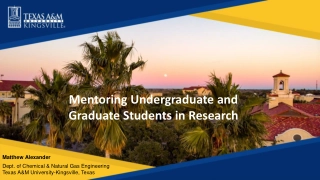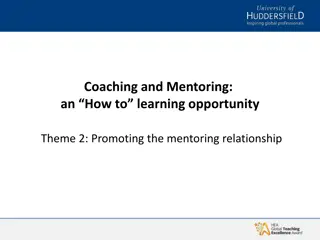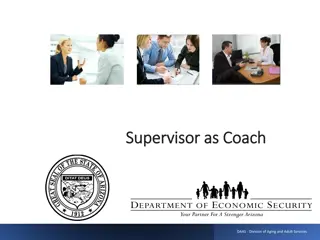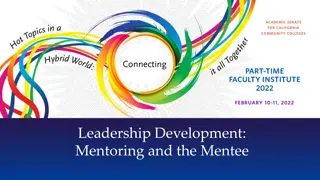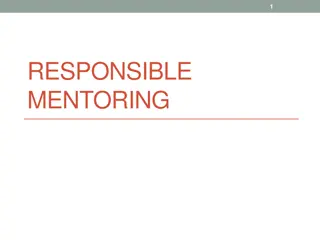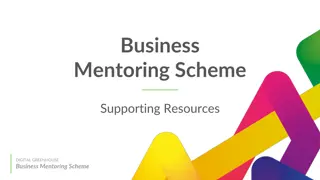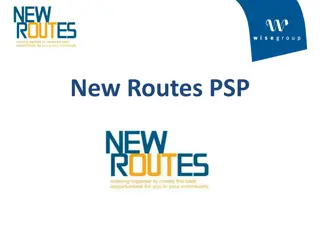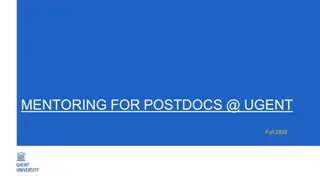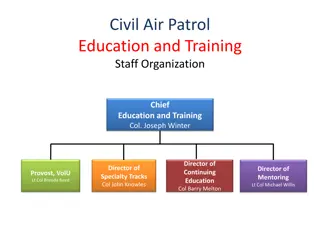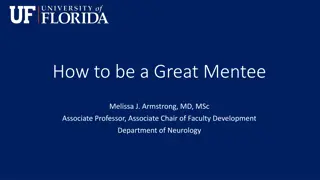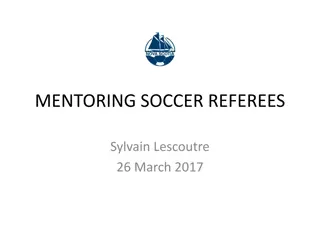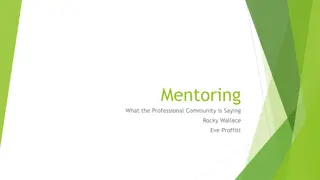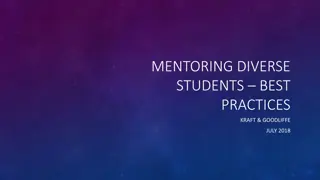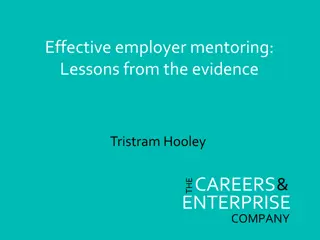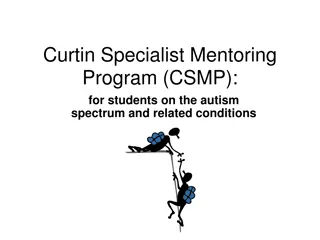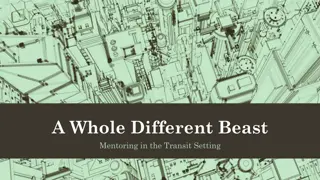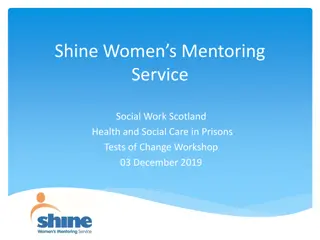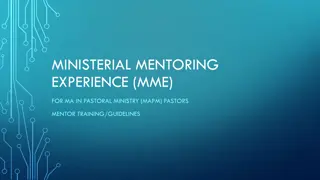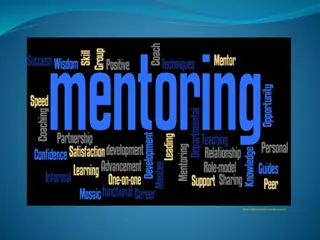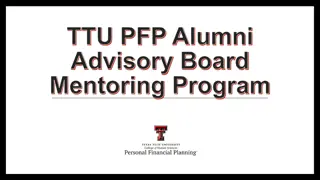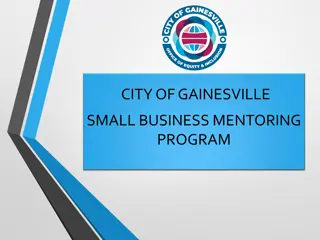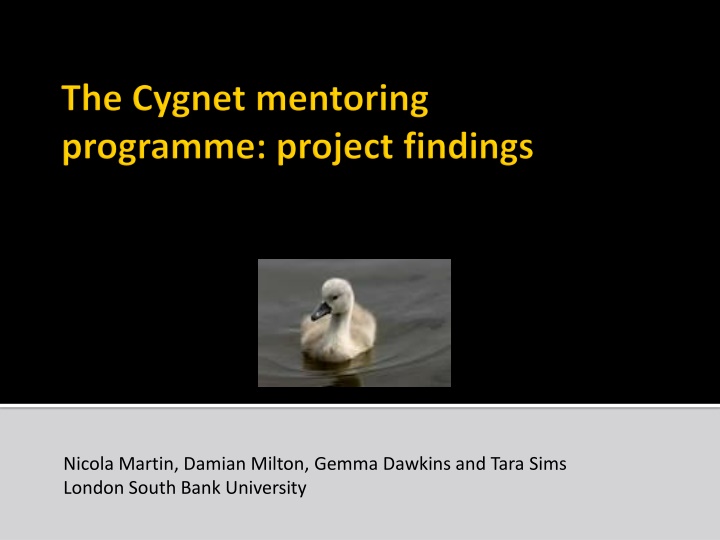
Supporting People on the Autism Spectrum Through Mentoring Programs
Living with constant stress and social disjuncture can lead to alienation and withdrawal. Mentoring programs can provide vital support for individuals on the autism spectrum, helping them thrive in education, employment, and community participation. The effectiveness of mentoring interventions is highlighted, emphasizing the need for specialized support services for adults with autism.
Download Presentation

Please find below an Image/Link to download the presentation.
The content on the website is provided AS IS for your information and personal use only. It may not be sold, licensed, or shared on other websites without obtaining consent from the author. If you encounter any issues during the download, it is possible that the publisher has removed the file from their server.
You are allowed to download the files provided on this website for personal or commercial use, subject to the condition that they are used lawfully. All files are the property of their respective owners.
The content on the website is provided AS IS for your information and personal use only. It may not be sold, licensed, or shared on other websites without obtaining consent from the author.
E N D
Presentation Transcript
Nicola Martin, Damian Milton, Gemma Dawkins and Tara Sims London South Bank University
Living with almost constant stress and social disjuncture, can result in alienation, isolation and withdrawal from society. An effective adequately supported mentor can help a person on the spectrum to cope, thrive and progress in education, employment and participation in their community on their own terms.
The National Audit Offices (2009)* report Supporting People with Autism through Adulthood highlighted the dearth of services for adults on the spectrum. At the 2007 forum Successful Futures for Adults with Autism many said that they would benefit from one-one, time-limited, goal-oriented support, akin to life coaching or mentoring. Specialist mentoring schemes for people on the autism spectrum are rare. *National Audit Office (2009) Supporting People with Autism through Adulthood
Mentoring and Befriending Foundation (2014): A time-limited goal-orientated relationship. Supports both personal and vocational learning and development. A voluntarily relationship in which goals and outcomes are directed by the mentee. It is not counselling, advocacy, coaching, befriending, buddying .
Goal-setting, action planning prioritisation and time-management. Change and transition. Challenges in social and personal interactions. Developing self-confidence. Getting to know new environments or procedures. Advice and guidance. Exploring options for the future. Giving (and receiving) constructive feedback.
A two year pilot project designed with significant input from people on the autism spectrum to evaluate a mentoring intervention. After mentor training, selection, matching and completion of the Melbourne Personal Wellbeing Index (PWI), 12 pairs meet for one hour per week over 6 months. Supervision was built in throughout. 3 Goals are set initially and reviewed later using the Salmon Line. Meeting record sheets are jointly completed and a reflective journal is individually completed after each session. After the final mentoring session, research assistants complete another evaluation and PWI with participants. Data was collected and analysed by the research team with input from The Advisory Group.
On the lines below, please mark how satisfied you are with your current level of attainment of each of your goals for mentoring Goal 1:____________________________________________________________________________ __________________________________________________________________________________ 1 2 3 4 5 6 7 8 9 10 Completely satisfied Completely dissatisfied (Adapted from Salmon 1988*) The person is asked to place him/herself on the line in relation to their perceptions of how they are performing in this area currently. Ideas for progressing towards achievement can be generated in small, achievable steps. For each aspect of life that is chosen, it is represented on a continuum with one end representing satisfaction in that area and the other representing dissatisfaction. Salmon P (1988) Psychology for Teachers: An Alternative Approach. London: Routledge
PWI All pre-intervention Pre (who finished) Post Difference Thinking about your own life and personal circumstances, how satisfied are you with your life as a whole? 5.08 6 7.8 1.8 How satisfied are you with your standard of living? 6.42 7.6 7.4 -0.2 How satisfied are you with your health? How satisfied are you with what you are achieving in life? How satisfied are you with your personal relationships? 5.92 6.8 7.6 0.8 5.08 5.4 7 1.6 5.08 5.8 6 0.2 How satisfied are you with how safe you feel? How satisfied are you with feeling part of your community? How satisfied are you with your future security? 6.42 7.4 8.8 1.4 5.27 7.5 7.5 0 5 6 6 0 How satisfied are you with your spirituality or religion? 6.25 8 8.5 0.5
All pre- intervention Pre (who finished) Post Difference 3.75 4 8 4
The involvement of autistic people throughout the project in the research team and advisory group was beneficial. The importance of good person-centred and insider-informed training. The importance of matching mentors with mentees and flexibility to change. Boundaries need to be supervised with care. Supervision from the research team. Mixed use and benefit from the Salmon Line.
Not scary, not intimidating, not hard to talk to, not someone who makes you feel uncomfortable to be around them. Overall the most important thing was the consistent weekly 'lifeline' at a time when my life literally fell apart. Even though I was going through a fundamental change (and not coping), there was a weekly reminder to make progress towards bigger goals. Without this I would have been like a ship without anyone at the helm (mentor) or chart (goals) in a storm.
It gives the mentee a safe way to practice social interaction without fear of the consequences of saying something wrong that you would have with family, friends or work colleagues. Young people with autism can become very anxious even in the simplest of social interactions at times, so having a safe place to find what works and what doesn t through personal experience is very important.
this helped me dig my way out of a life threatening hole that I could not see any way out of. It reminded me to make progress towards goals. [The mentor] Listened when I needed it, was a regular weekly marker in my chaotic life, provided an opportunity to reflect and plan and self manage. I wouldn't have done this otherwise.
Time limited goal orientated mentoring can be of great value to mentees. Boundaries have to be supervised with care. Training / supervision must be managed. Reliability of mentors is of fundamental importance. Involvement of people on the autism spectrum in all aspects is a particular strength.
The project has highlighted the potential benefits of time limited goal orientated mentoring and yet also, the lack of a rigorous evidence base underpinning current mentoring practice with autistic adults. The current situation is at best patchy and at worst dangerous. Lack of supervision of mentors is a particular concern. Training is not necessarily compulsory and unlikely to have been informed by trainers on the spectrum therefore mentors are potentially under prepared to take on their potentially life changing role. Without sufficient support and training, mentors may be left with insufficient means and resources to adequately support their mentees.
For staff working with students on the autism spectrum in post compulsory education in various roles including mentors & study skills tutors. Developed out of a two year Research Autism funded research project and a 20 + year background of autism research focussing on student experience and informed by autistic people. Accredited by the CPD Standard Office. Deliverable to large groups over one or (ideally) two days by accredited speakers in various locations. Bespoke to particular roles or settings. PG Cert Autism Mentoring and MA Education (Autism) available at LSBU (and other universities including SHU and Birmingham) for those who want to progress.
In order for the project to realise its emancipatory aim of ultimately producing something informed by and practically useful to people on the spectrum the following steps are proposed: Secure funding for research which will: Identify additional trainers who could be trained to deliver the training and a means of inducting and supervising new trainers, to include men and women on the spectrum. Deliver 8 further two day accredited training sessions over one year. Further develop standardised paperwork and online materials for recording mentoring sessions. Develop systems for ongoing evaluation. Further develop an ethical cost effective sustainable model of practice. Test the effectiveness of such a model on a wider level.
Professor Nicola Martin martinn4@lsbu.ac.uk Dr Damian Milton Gemma Dawkins Dr Tara Simms Jo Krupa

